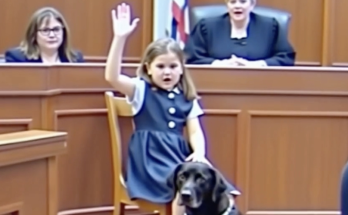After a challenging hospital stay, a woman in a small community found herself facing struggles far beyond what she had ever imagined. With limited financial resources and living on a fixed income, the simplest everyday tasks quickly became sources of stress and anxiety. While she focused her energy and resources on managing her health and affording essential medications, other responsibilities—like maintaining her home and yard—slowly slipped beyond her reach.
For years, the woman had taken great pride in her lawn. It was more than just a patch of grass; it was a place where she found comfort, peace, and a sense of normalcy. The sight of a well-kept yard brought her joy and pride, reminding her of better days and the life she once led. But after her hospital stay, that pride was replaced by worry and helplessness. Without the physical strength or financial means to care for it, the yard began to suffer, growing wild and unkempt.
Her financial challenges only deepened when her neighbor, who used to mow lawns in the area as a side job, began charging her for the service instead of helping out as before. The neighbor also started pressuring her for payment, which left the woman feeling trapped and desperate. Faced with dwindling funds, she was forced to make an agonizing decision: should she pay for lawn care to keep her home looking respectable, or should she save that money for the medications that were crucial to her survival? The stakes were high, and the choice felt impossible.
The burden weighed heavily on her every day. The thought of a neglected yard was painful, but the risk of running out of medicine was terrifying. She felt isolated and overwhelmed, unsure where to turn for help. Her health condition meant she had to prioritize treatments and doctor visits, but the creeping anxiety over the state of her home added an unspoken layer of emotional strain.
Then, a turning point came in the form of Raising Men Lawn Care Service, a local nonprofit dedicated to helping those in need by offering free lawn maintenance to struggling community members. Upon learning about her situation through word of mouth and community networks, the group stepped in without hesitation and offered to mow her lawn every two weeks—completely free of charge.
This simple yet profound act of kindness brought a wave of relief and gratitude that words could scarcely capture. For the woman, it was more than just someone cutting her grass; it was a lifeline, a restoration of dignity, and a glimmer of hope. No longer burdened by the impossible choice between health and home upkeep, she could focus more fully on healing and managing her condition without the added weight of worry about her lawn.
The impact rippled through her life. She described feeling lighter, more supported, and less alone. Her neighbors noticed the change, too—her home once again looked cared for, and her spirits lifted visibly. It was a reminder of how community support can transform lives in quiet, powerful ways.
News of the story spread quickly, inspiring others to act with kindness and empathy. Raising Men Lawn Care Service gained more volunteers and resources as people saw firsthand how one act of compassion could create a ripple effect, motivating others to look out for their neighbors. The organization became a symbol of hope in the community, showing that even in tough times, people can come together to lift each other up.
The woman’s experience also sparked conversations about the unseen struggles many face—especially those with health challenges and limited incomes. It highlighted the importance of community networks, nonprofit organizations, and simple kindnesses that can prevent people from slipping through the cracks.
For the woman, the help she received was not just about a tidy yard—it was about being seen, valued, and cared for. It reminded her and everyone watching that kindness and humanity often come in small packages: a lawn mower, a volunteer’s time, a willingness to step in when others are in need.
Her story stands as a testament to the quiet power of generosity and the importance of supporting each other beyond just grand gestures. It shows that compassion, when shared freely, strengthens the fabric of community and restores hope in unexpected ways.
In a world often filled with headlines about hardship and struggle, this story shines a light on the goodness that still exists. It teaches us that the simplest actions can have profound consequences—sometimes changing the trajectory of a life. And it calls on all of us to remember that kindness is not just a feeling but a choice, one that can make all the difference.
No matter how big or small, every act of compassion counts. Sometimes, all it takes is one person deciding to help, and suddenly, a life that seemed overwhelmed by challenges can begin to heal, grow, and flourish once again.
After a challenging hospital stay, a woman in a small community found herself facing struggles far beyond what she had ever imagined. With limited financial resources and living on a fixed income, the simplest everyday tasks quickly became sources of stress and anxiety. While she focused her energy and resources on managing her health and affording essential medications, other responsibilities—like maintaining her home and yard—slowly slipped beyond her reach.
For years, the woman had taken great pride in her lawn. It was more than just a patch of grass; it was a place where she found comfort, peace, and a sense of normalcy. The sight of a well-kept yard brought her joy and pride, reminding her of better days and the life she once led. But after her hospital stay, that pride was replaced by worry and helplessness. Without the physical strength or financial means to care for it, the yard began to suffer, growing wild and unkempt.
Her financial challenges only deepened when her neighbor, who used to mow lawns in the area as a side job, began charging her for the service instead of helping out as before. The neighbor also started pressuring her for payment, which left the woman feeling trapped and desperate. Faced with dwindling funds, she was forced to make an agonizing decision: should she pay for lawn care to keep her home looking respectable, or should she save that money for the medications that were crucial to her survival? The stakes were high, and the choice felt impossible.
The burden weighed heavily on her every day. The thought of a neglected yard was painful, but the risk of running out of medicine was terrifying. She felt isolated and overwhelmed, unsure where to turn for help. Her health condition meant she had to prioritize treatments and doctor visits, but the creeping anxiety over the state of her home added an unspoken layer of emotional strain.
Then, a turning point came in the form of Raising Men Lawn Care Service, a local nonprofit dedicated to helping those in need by offering free lawn maintenance to struggling community members. Upon learning about her situation through word of mouth and community networks, the group stepped in without hesitation and offered to mow her lawn every two weeks—completely free of charge.
This simple yet profound act of kindness brought a wave of relief and gratitude that words could scarcely capture. For the woman, it was more than just someone cutting her grass; it was a lifeline, a restoration of dignity, and a glimmer of hope. No longer burdened by the impossible choice between health and home upkeep, she could focus more fully on healing and managing her condition without the added weight of worry about her lawn.
The impact rippled through her life. She described feeling lighter, more supported, and less alone. Her neighbors noticed the change, too—her home once again looked cared for, and her spirits lifted visibly. It was a reminder of how community support can transform lives in quiet, powerful ways.
News of the story spread quickly, inspiring others to act with kindness and empathy. Raising Men Lawn Care Service gained more volunteers and resources as people saw firsthand how one act of compassion could create a ripple effect, motivating others to look out for their neighbors. The organization became a symbol of hope in the community, showing that even in tough times, people can come together to lift each other up.
The woman’s experience also sparked conversations about the unseen struggles many face—especially those with health challenges and limited incomes. It highlighted the importance of community networks, nonprofit organizations, and simple kindnesses that can prevent people from slipping through the cracks.
For the woman, the help she received was not just about a tidy yard—it was about being seen, valued, and cared for. It reminded her and everyone watching that kindness and humanity often come in small packages: a lawn mower, a volunteer’s time, a willingness to step in when others are in need.
Her story stands as a testament to the quiet power of generosity and the importance of supporting each other beyond just grand gestures. It shows that compassion, when shared freely, strengthens the fabric of community and restores hope in unexpected ways.
In a world often filled with headlines about hardship and struggle, this story shines a light on the goodness that still exists. It teaches us that the simplest actions can have profound consequences—sometimes changing the trajectory of a life. And it calls on all of us to remember that kindness is not just a feeling but a choice, one that can make all the difference.
No matter how big or small, every act of compassion counts. Sometimes, all it takes is one person deciding to help, and suddenly, a life that seemed overwhelmed by challenges can begin to heal, grow, and flourish once again.



